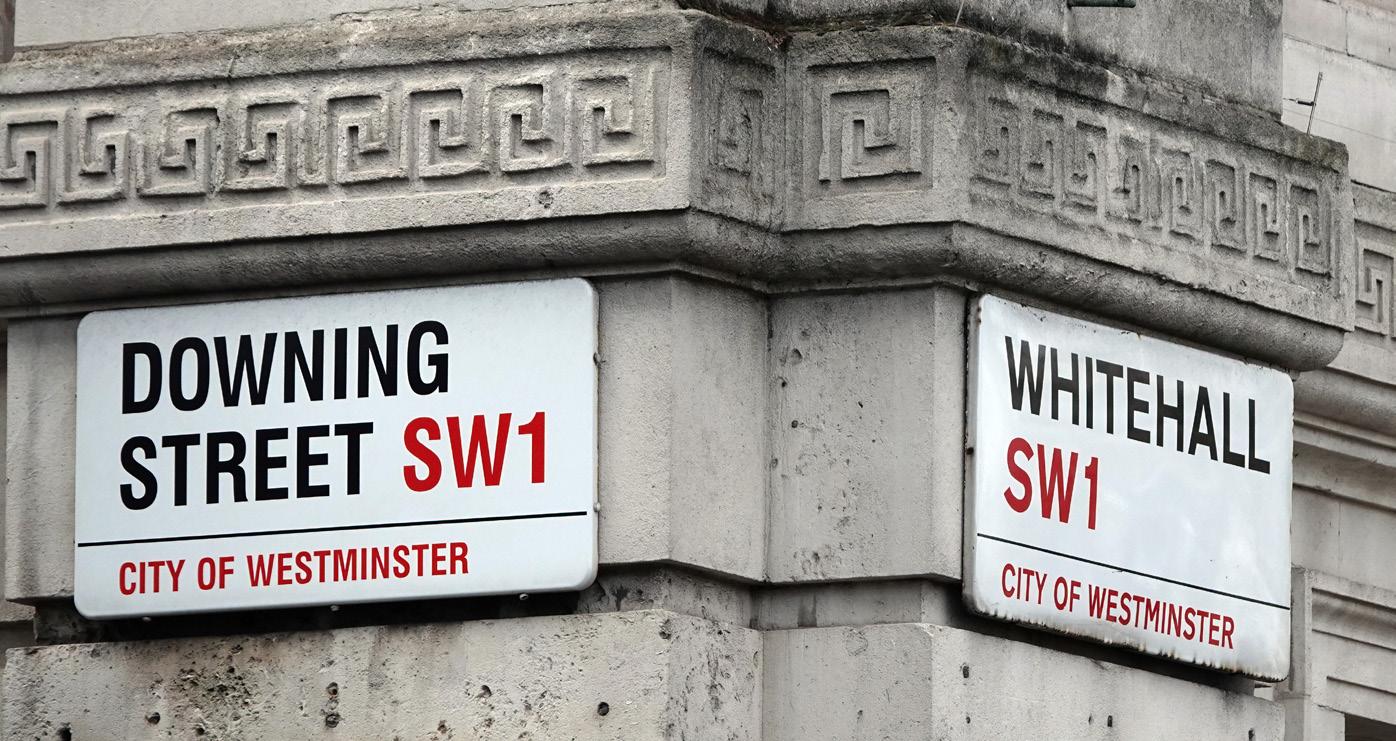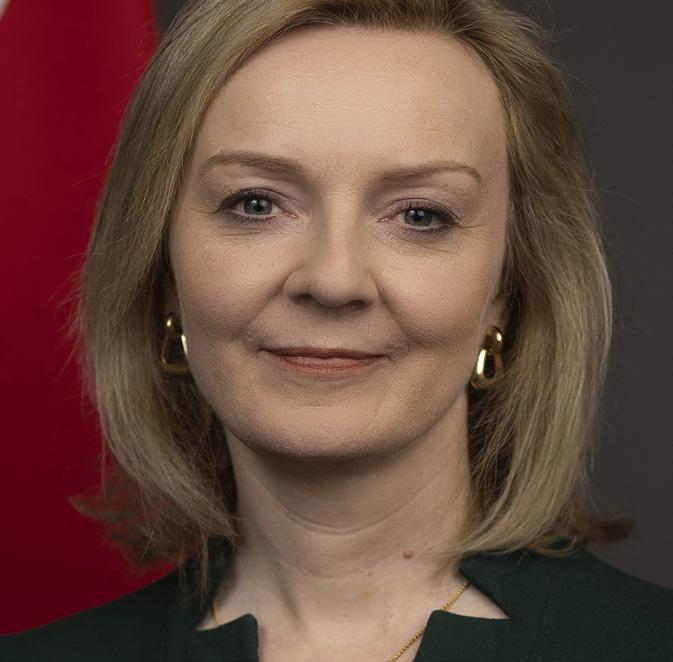
22 minute read
News
Liz Truss wins Tory leadership race and becomes prime minister
Liz Truss has been elected the new leader of the Conservative party and has become the new prime minister.
Truss won 57 per cent of the vote and became prime minister after meeting the Queen in Balmoral.
Previously, Truss has worked as environment secretary under David Cameron, justice secretary under Theresa May and foreign secretary under Boris Johnson.
In her campaign, she pledged to start cutting taxes from day one, including scrapping the National Insurance increase that came into force in April and suspending green taxes from energy bills.
READ MORE
QUEEN’S DEATH
Prime Minister pays tribute to Her Majesty

The prime minister has paid tribute to the Queen, following the announcement of her death.
Truss called the news “a huge shock to the nation and to the world” and said the Queen was the “rock on which modern Britain was built”.
She said: “Through thick and thin, Queen Elizabeth II provided us with the stability and the strength that we needed.
“She was the very spirit of Great Britain – and that spirit will endure.”
Others have also been paying tribute to Her Majesty with Northern Ireland secretary Chris Heaton-Harris saying: “I am deeply saddened at the news of the loss of Her Majesty, Queen Elizabeth II.
“Throughout her reign, Her Majesty has been the matriarch and pillar of our country and the Commonwealth. She has always provided wise counsel, admirably and selflessly, fulfilling a lifetime commitment to public service.”
First Minister of Scotland Nicola Sturgeon said: “Her Majesty The Queen gave decades of her life in service and has died today here in Scotland as our longest-serving monarch.
“Our condolences are with The King, The Queen Consort and the wider Royal Family. Millions around the world will share their grief but only they will feel the loss of a mother and grandmother.”
READ MORE ECONOMY
BCC Economic Forecast: New PM must act as UK economy set for recession before year end

The BCC expects the UK economy to plunge into recession before the end of 2022, with inflation spiking to 14 per cent and lingering weakness in growth expected to continue into 2024.
In the short term, the BCC is now forecasting a recession for the UK economy with three consecutive quarters of contraction between Q2 and Q4 in 2022. Annual expectations for GDP growth also continue to decline, with 3.3 per cent forecast for 2022, significantly below the 7.4 per cent growth recorded in 2021. However, unlike the Bank of England, the BCC expects the economy to grow in 2023, albeit at a very low 0.2 per cent, with a slight increase to 1 per cent in 2024.
These anaemic predictions for GDP growth are in light of deteriorating economic conditions; rising energy costs, a decline in household spending and real wages; weaker export prospects and a pessimistic global economic outlook; poor investment conditions and weakening business confidence and cashflow. Many of these issues were initially caused by the global response to Covid-19 and have been further compounded by the war in Ukraine.
Businesses and consumers will continue to face exceptionally high costs as rampant inflation spirals upwards in 2022. Increased and more sustained inflationary pressure is now forecast for Q4 2022, as the Consumer Price Index (CPI) inflation rate is expected to reach a peak of 14 per cent. This is up from the previous, already high, projected rate of 10 per cent. The CPI rate is expected to slow to 5 per cent in 2023, and finally return to the Bank of England’s target of 2 per cent in 2024.
The forecast for the Bank of England’s interest rate remains unchanged; the rate is expected to increase from 2 per cent in 2022 to 3 per cent in 2023 and 2024. Inflation is expected to outpace growth of earnings by over 3:1 in Q4 2022, with average earnings increasing by 4.5 per cent in Q4 2022.
READ MORE
New PM Truss appoints cabinet ministers

ENERGY
The new prime minister Liz Truss has announced new ministerial appointments.
Kwasi Kwarteng is chancellor, James Cleverly has been made foreign secretary and Suella Braverman has become home secretary. Therese Coffey has been appointed health secretary and deputy prime minister.
No one who backed Truss’s leadership rival Rishi Sunak is in the full cabinet - Dominic Raab, Grant Shapps, George Eustice and Steve Barclay will be returning to the back benches.
Priti Patel and Nadine Dorries will also not be in the newly formed cabinet.
READ MORE
Government announces energy price cap
The prime minister has set out a new Energy Price Guarantee, with the aim of supporting people and business with their energy bills.
It means the typical UK household will now pay up to an average of £2,500 a year on their energy bill for the next two years.
The cap is automatic and applies to all households.
Based on current energy prices, this will save the average household around £1,000 a year.
Prime minister Liz Truss said: “Decades of short-term thinking on energy has failed to focus enough on securing supply – with Russia’s war in Ukraine exposing the flaws in our energy security and driving bills higher. I’m ending this once and for all.
“I’m acting immediately so people and businesses are supported over the next two years, with a new Energy Price Guarantee, and tackling the root cause of the issues by boosting domestic energy supply.
“Extraordinary challenges call for extraordinary measures, ensuring that the United Kingdom is never in this situation again.”

READ MORE
INFRASTRUCTURE
Councils to have more power to decide on infrastructure levy spending Scottish government announces rent freeze
Following a government amendment to the Levelling Up Bill, councils will have more freedom to decide how to spend funds from the Infrastructure Levy.
Last week, Marcus Jones, who was planning minister at the time, introduced a clause that means levy funds can be spent on “non-infrastructure matters” such as improving local services.
He said: “We expect to capture more value from developments because we will be capturing the value of the uplift of the finished product.”
However, it was criticised by some, with Labour’s shadow planning minister Matthew Pennycook saying: “We feel very strongly, as I think local communities will, that the proceeds of an infrastructure levy should be spent on infrastructure in their area.”
Another amendment was also introduced by Jones which would mean completion notices will no longer require confirmation from the Secretary of State.
He said: “Local planning authorities should not be discouraged from using them where appropriate and where the existing process for serving notices is long, slow and unnecessarily complex.”
He continued to say that the new powers were ‘discretionary’ and “will not create significant additional resourcing burdens for local planning authorities”.

READ MORE The Scottish government has announced a combined rent freeze and moratorium on evictions with the intention of helping people with the cost-of-living crisis.
The announcement is the centrepiece of the 2022-23 Programme for Government (PfG).
The PfG sets out emergency legislation to be introduced to impose a rent freeze until at least 31 March 2023 and a moratorium on evictions, as well as a new tenants’ rights campaign.
A new website will also be introduced to give information on the benefits and support available to help people through the current cost-of-living crisis.
The programme also includes the roll out of free school meals across all primary school age groups, will double the Fuel Insecurity Fund to £20 million to help households at risk of self-disconnection or self-rationing of energy, will freeze rail fares until March 2023 and will extend the Warmer Homes Fuel Poverty Programme.
First Minister Nicola Sturgeon said: “This Programme for Government is published in the context of the most severe cost crisis in many of our lifetimes. It is a crisis pushing millions into poverty and poses a genuine danger, not just to livelihoods, but to lives.
“The Scottish Government is already committed to a range of measures, worth almost £3 billion this year, that will help with rising costs. But the magnitude of what is being experienced by people and businesses means that mitigation is nowhere near sufficient. What is needed now is action on a scale similar to the initial Covid response.
“Regrettably, the powers to act in the manner and on the scale needed do not lie with this Parliament. In my view, they should lie here. If they did, we could have acted already. But they don’t. These powers are reserved to Westminster.
“The cost crisis means this Programme for Government is more focussed than ever before – deliberately so – with priority actions to provide help now.
“To that end we will provide more help for people who may be at risk of self-rationing or even self-disconnection from their energy supply and we will double the Fuel Insecurity Fund to £20 million this year.
“We will also propose emergency legislation to put in place a rent freeze until at least March and a moratorium on evictions.”

READ MORE

PM speaks to world leaders in first week on the job
New prime minister Liz Truss has had calls with several world leaders in her first week on the job and following the death of Her Majesty The Queen.
With Dutch prime minister Mark Rutte, she discussed the importance of the UKNetherlands relationship. She also spoke to French president Emmanuel Macron and discussed working together to tackle the energy crisis, as well as security, defence and strategic issues. The same day, she spoke to Polish prime Minister Mateusz Morawiecki about supporting the people of Ukraine.
Truss also spoke to Narendra Modi, prime minister of India about the importance of the relationship between the two countries and to New Zealand Prime Minister Jacinda Arden to whom she expressed condolences following the capsize of a boat off the coast of the South Island.
All the leaders shared their condolences following the death of Her Majesty The Queen.
READ MORE
DEVOLUTION
Devolution deal announced for East Midlands

The government has announced a £1.14 billion devolution deal for the East Midlands to cover Derbyshire, Nottinghamshire, Derby and Nottingham.
The deal includes a guaranteed income stream of £38 million per year over a 30-year period for the region.
The East Midlands combined authority would be one of the biggest in the country, with an area home to around 2.2 million people.
The city and council leaders in Derbyshire, Nottinghamshire, Derby and Nottingham have already signed up to work on the deal with the government.
Barry Lewis, Leader of Derbyshire County Council, Ben Bradley MP, Leader of Nottinghamshire County Council, Chris Poulter, Leader of Derby City Council, and David Mellen, Leader of Nottingham City Council, met with Greg Clarke MP, then Secretary of State for Levelling Up, Housing and Communities at Rolls Royce in Derby, where the deal was agreed in principle.
The details of the deal will be worked on by the councils and each council will take a report to approve a more detailed proposal for a consultation later this year.
The deal is a new type of combined authority, which requires new legislation from central government. On top of the £1.14 billion, an extra £16 million will be included for new homes on brownfield land as well as control over budgets such as the Adult Education Budget.
The deal will be a level 3 deal, offering the most local powers and funding. The deal would include a new elected regional mayor, who would represent both cities and counties and look at major issues that affect the whole region.
In a joint statement, Ben Bradley MP, Leader of Nottinghamshire County Council, Barry Lewis, Leader of Derbyshire County Council, Chris Poulter, Leader of Derby City Council, and David Mellen, Leader of Nottingham City Council, said: “We welcome the £1.14 billion devolution deal from the Government on offer for our region. It’s fantastic news.
“We want to make the most of every penny so this can be used to make a real difference to people’s lives.
“As Leaders, we have all fought for a fairer share for our cities and counties, and a bigger voice for our area, to give us the clout and the influence we deserve, and to help us live up to our full potential.
“This deal would help make that a reality, creating more and better jobs through greater investment in our area, with increased economic growth, better transport, housing, skills training, and an enhanced greener environment, as we move towards being carbon neutral. These are what we all want to see, and we will work together for the common good of the East Midlands.
“We haven’t always had the same level of funding or influence as other areas, which has held us back. This is a golden opportunity to change that and put the power to do so in our own hands.
“There is a lot still to be agreed, and this is the beginning of the journey, not the end. We’re determined to build on this deal over time, as other areas have done.”
If the deal is approved, legislation will be passed to create the new combined authority. The first mayoral election would be in May 2024.
The new combined authority would be led by the regional mayor and would include representatives from local councils. Local councils would not be scrapped or merged and would continue to exist and still be responsible for most public services in the area. The mayor and combined authority will be focussing on wider issues including transport, regeneration and employment.
READ MORE EV CHARGING
Government announces funding for EV charge points
The Department for Transport has announced funding for for more than 1,000 electric vehicle charge points across the country.
The new pilot will be supported by £20 million of government and industry funding.
The Local EV Infrastructure (LEVI) pilot scheme will involve local authorities and industry working together to create new, commercial EV charging infrastructure for residents, including faster on-street chargepoints and larger petrolstation-style charging hubs.
The areas set to receive funding include Barnet, Dorset, Durham, Kent, Midlands Connect, North Yorkshire, Nottinghamshire, Suffolk and Warrington.
The scheme aims to help those with electric vehicles, but no private driveways, to access EV chargers.
Local authorities will be able to provide feedback on how to grow the network and the role the private sector can play.
Decarbonisation Minister Trudy Harrison said: “We want to expand and grow our worldleading network of EV chargepoints, working closely with industry and local government, making it even easier for those without driveways to charge their electric vehicles and support the switch to cleaner travel.
“This scheme will help to level up electric vehicle infrastructure across the country, so that everyone can benefit from healthier neighbourhoods and cleaner air.”
Edmund King OBE, AA president, said: “It is essential that more on-street chargers are delivered to boost the transition to zero emission vehicles for those without home charging.
“This injection of an extra £20 million funding will help bring power to electric drivers across England from Durham to Dorset. This is one further positive step on the road to electrification.”
READ MORE
Wrexham officially becomes a city

Wrexham has officially become Wales’s seventh city.
The city gained the status through a competition as part of the Queen’s Platinum Jubilee celebrations. The official “Letter Patent” confirms city status from 1 September.
The six other cities in Wales are Cardiff, Swansea, Newport, Bangor, St Davids and St Asaph. St Asaph became a city 10 years ago, as part of the Diamond Jubilee celebrations.
A month of weekend events are planned throughout September to celebrate Wrexham.
Secretary of State for Wales, Sir Robert Buckland said: “Congratulations to Wrexham on achieving city status. The city and surrounding area already has so much to offer – it’s home to the famous Wrexham Lager Brewery, the Unesco World Heritage Pontcysyllte Aqueduct and a fantastic football club which is Wales’s oldest and one of the oldest in the world.
“There is already much for Wrexham to be proud of and its future is equally exciting. I hope that the city of Wrexham continues to prosper and grow.”
Councillor Mark Pritchard, Leader of Wrexham Council, said: “We have so much to celebrate in Wrexham. We have an amazing World Heritage Site, and incredible football club with incredible owners, and a rich and diverse arts and culture scene. We have strong links with our armed forces, world-class businesses and friends all over the world.
“But our greatest asset is our communities, and it’s the amazing passion, character and creativity of the people who live here that make Wrexham what it is.
“City status is a wonderful achievement and reflects the growing confidence and ambition we have in Wrexham. I’d like to thank everybody who supported the ambitious city status bid, from MPs and MSs, to elected councillors, and all the businesses within Wrexham and beyond.
“I’d also like to thank Her Majesty the Queen for granting Wrexham city status. We’ve received congratulations from supporters and friends all over the world, and this is a truly historic day.”
READ MORE
LEVELLING UP


The Department for Environment, Food & Rural Affairs and the Department for Levelling Up, Housing and Communities have announced a £110 million fund intended to level up rural communities.
The fund aims to help rural business such as farms, pubs and wedding venues and will be invested in projects which will boost productivity and create rural job opportunities. Examples could include converting farm buildings to other business uses, such as farm shops; rural tourism, such as investments in visitor accommodation; and creation of new footpaths and cycle paths.
The Rural England Prosperity Fund will be delivered by eligible local authorities.
Then Secretary of State for Levelling Up, Greg Clark MP said: “This major investment in rural businesses will help us boost the countryside economy and close the rural productivity gap.
“It’s our mission to spread opportunity across the whole of the UK and this funding will help us do just that.”
READ MORE HOUSING
Social housing rent cap consultation announced
The government has launched a consultation looking for views from social housing tenants and landlords on a proposed rent cap with the aim of understanding how to support households with the cost of living.
The proposals include a cap on social housing rent increases for the coming financial year. A cap of three per cent, five per cent and seven per cent are being considered.
It is believed the cap could save tenants an average of £300 a year. The cap also aims to provide stability with rising inflation.
Social housing rent increases are regulated by the government. They are currently set at up to the consumer price index (CPI) rate plus 1 per cent. This means a potential increase of 11 per cent next year in line with Bank of England forecasts.
The rent cap would be temporary and apply from 1 April 2023 to 31 March 2024. The consultation is also seeking views on whether to set a limit for 2024-2025.
A final decision will be announced later this year, following the consultation.
Then housing secretary Greg Clark said: “We must protect the most vulnerable households in these exceptional circumstances during the year ahead. Putting a cap on rent increases for social tenants offers security and stability to families across England.
“We know many people are worried about the months ahead. We want to hear from landlords and social tenants on how we can make this work and support the people that need it most.”
Geeta Nanda OBE, Chair of the G15 group of leading housing associations and Chief Executive of MTVH, said: “We are deeply concerned by the impact cost of living pressures are having on the people we provide homes to. G15 members have increased support for residents, including providing additional funding for vital crisis support, on top of the work we are doing to bring down people’s energy bills by improving the energy performance of the homes we provide. The support government has announced for energy bills is welcome, but it is clear that further assistance is urgently needed.
“All G15 members recognise the current high rates of inflation and are considering the impact of this on residents and the essential work we do carefully. To maintain and improve existing residents’ homes, as well as continuing to build much needed new affordable homes, significant investment each year is essential. Rental income is critical to supporting this work. Housing associations have already seen costs for vital materials for repairs and maintenance work increase by as much as 16.8 per cent this year, and the cost of constructing new homes has grown by more than 11 per cent as well.
“In getting the balance right on rent setting, we are committed to maintaining affordability for residents. We welcome the government’s consultation and the opportunity to discuss these important issues further.”

READ MORE
Advertisement Feature The Destination office
While the office remains the place for collaboration and decision-making, a working space that encourages people to attend strengthens the value of the office real estate. Visavvi has a track record in creating environments that employees love to use

Over the last two years the Covid pandemic has affected and influenced working cultures on a huge scale. Initially organisations scrambled to equip their employees with technology that enabled them to be productive whilst working from home thus helping drive a video-enabled meeting revolution. Many individuals embraced the improved work life balance, enjoyed more comfortable and attractive surroundings, and gained instant, unrestricted access to tools that improved their productivity and job satisfaction. The lifting of restrictions and an ability to gradually return to the workplace saw the emergence of hybrid working, where employees divided their time between working at home and the office.
The traditional office
As employers struggle with the challenges of retaining and recruiting talent into their business, ensuring employees are comfortable in their workplace is going to become more and more important, with many UK employees confident that they could easily find a new role if they decided to move company. The challenge is to create workplaces that employees want to go to rather than need to go. Providing attractive, comfortable, informal, flexible and highly effective workplaces will be critical to employee retention, recruitment and morale for the future.
Work patterns may have changed but the office remains a centre point for key decision making, collaboration and crucially for building a corporate identity and maintaining team moral.
The Destination office
In simple terms a Destination office is a location people want to go to, not one they have to. By creating an environment that encourages people to attend a physical workplace, it strengthens the value of the office real estate.
The look and feel of the office space should create a relaxed feeling, one that puts staff wellbeing at the centre of workplace design. The spaces need to reflect modern collaborative workflows and styles including collaboration, meeting, huddle, project, agile, scrum, group and personal video collaboration. Each space needs to be equipped with suitable furniture, decoration, lighting, acoustic conditioning and of course technology that empowers users.
Environments need to be comfortable, inspiring, productive, effective, and available. Technology needs to be intuitive, flexible and provide enhanced communication and collaboration capabilities beyond those available when working from home.
Key technologies driving Destination workplaces are likely to include:
Microsoft Team Rooms and Zoom Rooms
Employees returning to the workplace are looking for ways to use the same collaboration tools they have so successfully used at home, within the office environment. Powered by Microsoft and Zoom platforms, any meeting space can be transformed into a professional, feature-rich, video-enabled collaboration environment experience for all participants.
As a retrofit to an existing AV system or as a new installation, these certified solutions transform meeting spaces into highly effective collaboration and natural communication hubs.
Occupancy management systems
Crucially when employees attend the office, they need to know they have a space to work. Likewise, employers need to know if these spaces are used effectively, and which spaces are in most demand. Desk and room booking solutions allow staff to quickly reserve hot desks and meeting rooms easily. Centrally managed and monitored, these solutions allow workplace managers to accurately make decisions regarding future workplace design and utilisation.
Interactive collaboration screens
One of the biggest frustrations for home workers is the lack of interactive collaboration between colleagues. Touch screen collaboration devices such as the Microsoft Surface Hub, Avocor and Clevertouch provide a large powerful canvas where colleagues work on content, plans and projects together. They provide an experience that cannot be replicated in the home office and actively create the opportunity for professional team interaction.
Content collaboration
Many users will want to use their own device in the meeting room, so spaces need to be designed to facilitate this. Solutions based around bring your own device (BYOD) and bring your own meeting (BYOM) enable laptops to be used as effective, productive collaboration hubs in the meeting room. With solutions such as the Barco clickshare conference, meeting participants simply click and connect wirelessly to in-room displays and videocollaboration devices. Using wireless content sharing positively transforms the user experience and productivity of any meeting space.
Immersive collaboration rooms
Using immersive, virtual reality technologies creates stimulating and visually stunning environments where users exist within their content as it is displayed around the entire room. Any content can be displayed with ease in these immersive space, creating an environment where meetings become more productive, training sessions become more stimulating, and ideas and designs come to life.
Visavvi - an SCC business
Visavvi are multi award-winning workplace technology experts and have over five decades of experience designing and implementing ingenious business collaboration environments. With global businesses and large public sector clients, Visavvi harness technology to create intuitive, agile meeting and collaboration environments that people love to use. L
FURTHER INFORMATION










